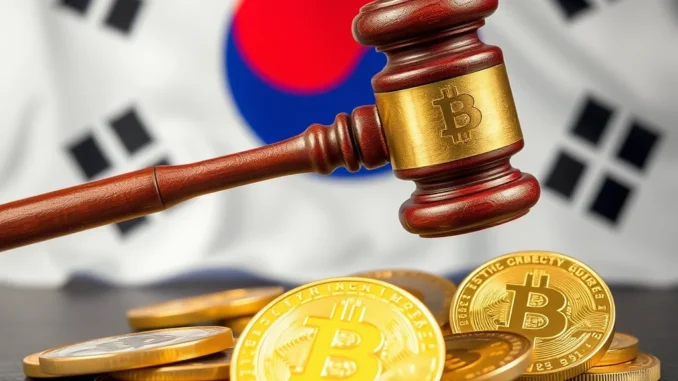
In a stunning turn of events that has sent ripples through South Korea and the cryptocurrency world, a local government official in Cheongju is under fire for allegedly embezzling a significant sum of disaster relief funds. The accusations point towards the official using these misappropriated funds for personal cryptocurrency investments, a scandal that highlights the intersection of traditional finance and the burgeoning digital asset landscape. Let’s delve into the details of this developing story and understand the implications of crypto embezzlement in the public sector.
Unveiling the Crypto Embezzlement Scandal in South Korea
The saga unfolded in Cheongju, South Korea, where a diligent investigation by the Board of Audit and Inspection unearthed a disturbing misuse of public funds. According to reports from Channel A, a local news outlet, a government official stands accused of siphoning off disaster relief funds for personal enrichment. The modus operandi? Allegedly, the official exploited the mayor’s seal to create an unauthorized bank account under the city’s name. This clandestine account became the conduit for a series of illicit transactions.
Here’s a breakdown of the key findings:
- Unauthorized Account: The official allegedly misused the mayor’s seal to establish an account bearing the city’s name without proper authorization.
- Embezzled Amount: A staggering 497.16 million won, equivalent to approximately $341,000 USD, was embezzled.
- Transaction Trail: The embezzlement occurred over 45 separate transactions, spanning from September 2018 to June of last year, indicating a systematic and prolonged misuse of funds.
- Alleged Purpose: The investigation suggests the pilfered funds were channeled into cryptocurrency investments and used to settle personal debts.
- Legal Proceedings: The official was formally indicted last year, and the trial is currently underway, promising a protracted legal battle.

How Did a South Korean Official Exploit Relief Funds for Crypto?
The alleged method employed by the South Korean official to embezzle funds is both audacious and concerning. By gaining unauthorized access to the mayor’s seal, the official bypassed standard bureaucratic protocols and created a shadow account. This highlights potential vulnerabilities in governmental financial oversight and the ease with which determined individuals might exploit these weaknesses.
Let’s break down the possible steps involved:
- Seal Misuse: Obtaining and misusing the mayor’s official seal was the first critical step. This seal is a symbol of authority and is typically required for official city documents and financial transactions.
- Account Creation: With the seal in hand, the official could open a bank account under the guise of the Cheongju city administration. Banks often rely on official seals to verify the legitimacy of government accounts.
- Fund Diversion: Disaster relief funds, intended for legitimate purposes, were then diverted into this unauthorized account. The exact mechanism of diversion is still under investigation, but it likely involved manipulating financial processes and exploiting loopholes.
- Crypto Investments & Debt Repayment: Once the funds were secured in the illicit account, they were allegedly transferred to cryptocurrency exchanges for investment and used to pay off personal debts.
Cryptocurrency Investments and the Allure of Quick Gains
The case underscores the continuing allure of cryptocurrency investments, even for those in positions of public trust. The promise of high returns, though often accompanied by significant risk, can be a powerful motivator. In this instance, it appears the official succumbed to this temptation, allegedly using embezzled public funds to chase potentially lucrative crypto gains. This incident raises crucial questions about financial oversight and the ethical considerations for public officials engaging with digital assets.
Why might someone in a stable government position risk everything for crypto investments?
- High Potential Returns: Cryptocurrencies are known for their volatility and potential for rapid price appreciation, offering the allure of quick wealth.
- Decentralized Nature: The decentralized and often less regulated nature of crypto markets might have been perceived as offering anonymity and reduced traceability compared to traditional financial systems.
- Financial Pressures: Personal debts, as mentioned in the reports, could have driven the official to seek high-risk, high-reward investments in an attempt to alleviate financial strain.
- Lack of Oversight: Perceived or actual gaps in financial oversight within the local government might have emboldened the official to believe such activities could go undetected.
The Fallout: Trust Erosion and Calls for Stricter Oversight
This crypto embezzlement case is more than just a financial crime; it’s a significant breach of public trust. Citizens rely on government officials to manage public funds responsibly, especially those earmarked for disaster relief. Such incidents erode public confidence in government institutions and can have far-reaching consequences for civic engagement and social cohesion.
The immediate fallout includes:
- Erosion of Public Trust: The scandal damages the reputation of the Cheongju local government and potentially broader public trust in South Korean governance.
- Increased Scrutiny: This case will likely lead to increased scrutiny of financial controls and oversight mechanisms within local governments across South Korea.
- Policy Re-evaluation: There may be calls for re-evaluating policies regarding public officials’ involvement with cryptocurrency and other high-risk investments.
- Legal Ramifications: The ongoing trial will determine the legal consequences for the official involved, setting a precedent for similar cases in the future.
Actionable Insights: Strengthening Financial Integrity
The Cheongju crypto embezzlement incident serves as a stark reminder of the need for robust financial controls and ethical conduct in public service. What lessons can be learned and what actionable steps can be taken to prevent similar incidents in the future?
- Enhanced Internal Controls: Implement stricter internal controls and audit procedures within government bodies, particularly concerning access to official seals and the creation of bank accounts.
- Regular Audits: Conduct more frequent and comprehensive audits of government financial transactions, with a focus on identifying and flagging unusual or unauthorized activities.
- Transparency and Accountability: Promote greater transparency in government financial operations and enhance accountability mechanisms for public officials.
- Training and Ethics Programs: Provide mandatory training programs for public officials on financial ethics, conflict of interest, and the responsible management of public funds.
- Digital Asset Regulations: As cryptocurrency becomes more mainstream, governments may need to develop clearer guidelines and regulations regarding public officials’ involvement with digital assets to mitigate risks of misuse and conflicts of interest.
Conclusion: A Wake-Up Call for Crypto and Public Trust
The shocking case of a South Korean official allegedly embezzling relief funds to invest in cryptocurrency is a stark reminder of the challenges and risks that come with the intersection of digital finance and public governance. It underscores the critical importance of robust financial oversight, ethical conduct, and maintaining public trust. As the trial unfolds, the cryptocurrency community and the wider public will be watching closely, hoping for justice and systemic changes that prevent such breaches of trust from happening again. This scandal serves as a potent wake-up call, urging for greater vigilance and stronger safeguards in the evolving landscape of digital finance and public service.



